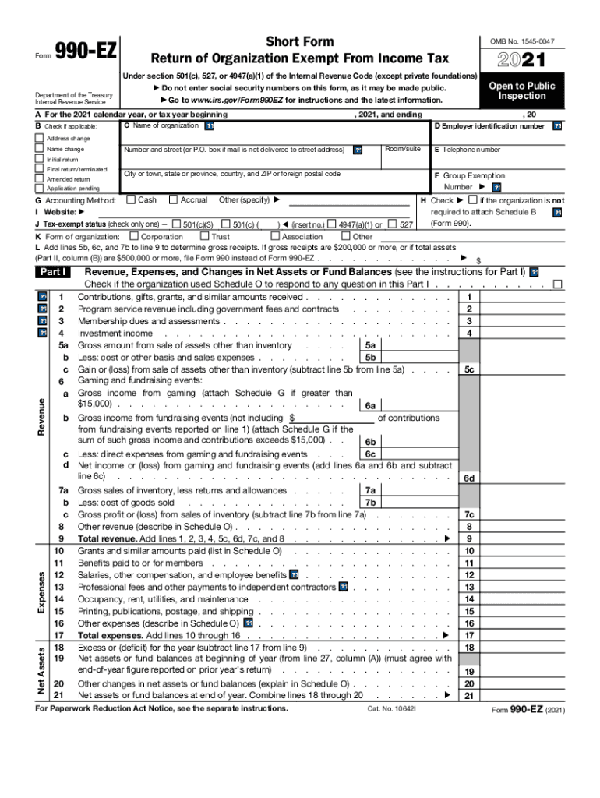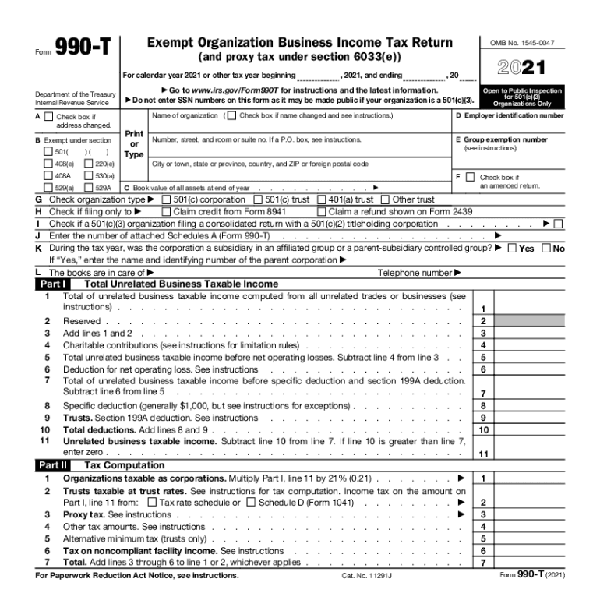What is IRS Form 990?
IRS Form 990 is a nonprofit organization’s annual tax return. While nonprofits with 501(c)(3) tax exemption status might not pay federal taxes, they still must file IRS Form 990 annually (we address a few exceptions below). Filing a Form 990 demonstrates that the nonprofit is conducting business that complies with its public, nonprofit responsibilities. In addition, IRS Form 990 provides the IRS with an overview of the nonprofit’s activities throughout the last fiscal year. Additionally, IRS form 990 is made public and available to donors, which in turn helps donors understand how the nonprofit operates and is managed. Read further for more information about the 2023 IRS tax form requirements for tax year 2022.
One Size Does Not Fit All
There are multiple versions of Form 990. Choosing the correct one depends on many factors, including the organization’s revenue, assets, and tax-exempt structure. Below, you’ll find an explanation of the different versions of Form 990. If you still have questions about which is suitable for your organization, BryteBridge specialists are ready to assist.

990 N - Small 501(c)(3) organizations with gross receipts that are normally less than $50,000.
Organizations with less than $50,000 in gross revenue qualify to file Form 990-N. The IRS sometimes refers to 990-N as the e-Postcard. The 990-N is the most basic report for organizations, but there are better choices than the 990-N.
As a Nonprofit consultant, BryteBridge often advises filing the 990-EZ (described below) instead of the 990-N to be transparent with the public. A 990-N does not provide any details other than the organization remaining under $50,000 in gross revenue. Your 990 is more than just a mandatory filing — it is the face of your organization and an opportunity to show the public that your nonprofit is well organized. The 990-EZ itemizes financial data for public inspection, while the 990-N does not. Also, many states require Form 990 to be filed along with annual solicitation renewals. These states will not accept the 990-N to meet this requirement. Further, major donors and foundation grantors often rely on a review of Form 990-EZ or 990 (described below) to make giving decisions.
Nonprofits in MA, NY, MI, and NH cannot file the 990-N, regardless of gross revenue, as these states require complete financial disclosure.
990 EZ
Organizations with less than $200,000 in gross revenue and assets under $500,000 qualify to file Form 990-EZ. The IRS also refers to 990-EZ as the Short Form return.
For example, an organization may have $35,000 in gross revenue, which means it qualifies for the 990-N filing. However, say the organization owns the building where it conducts operations, and its value is $300,000. Because of the significant asset the origination owns, it must file the 990-EZ instead of the 990-N.
990 (Full Form)
To keep things confusing, the IRS Return of Organization Exempt From Income Tax is Form 990. There is no additional designation. At BryteBridge, we refer to form 990 as the Full Form because it is the complete 990 annual report. Organizations with more than $200,000 in gross revenue or assets greater than $500,000 must file Form 990 (Full Form).
Using the same example above, say the nonprofit’s gross revenues remain at $35,000, but the building reappraises for $750,000. While the organization’s revenue qualifies it to file the 990-N, its asset requires the 990 (Full Form). Organizations that otherwise qualify to file Form 990-N or 990-EZ may also choose to file the Full Form for public transparency and accountability.

990 PF - Private Foundations
Private Foundations are a specific type of 501(c)(3) tax-exempt organization. All private foundations must file Form 990-PF instead of any other 990 verities, regardless of revenue or assets
990 T -Unrelated Business Income
When a nonprofit organization incurs unrelated business income greater than $1,000, it must file Form 990-T in addition to form 990 (Full Form). Using the same example from above, say the organization sells parking spaces for local events. Since this is unrelated to the nonprofit’s mission, it is unrelated business income and requires paying Unrelated Business Income Tax (UBIT). When an organization expects to pay UBIT, it must complete quarterly tax estimations using form 990-W, even if the estimated tax is less than $500.
Generally, any organization with unrelated business income should seek the advice of a tax professional. The specialists at BryteBridge are ready to assist with your 990-T and UBIT questions.

When is IRS Form 990 Due to the IRS for Tax Year 2022?
The IRS requires every organization to file a tax return on or before the 15th day of the fifth month following the conclusion of an organization’s tax year.
When you are ready to start the conversation or process, contact BryteBridge Nonprofit Solutions to help prepare and file yours! Organizations that make less than $50,000 and do not plan on applying for grant opportunities may file form 990N starting at $149.00 with BryteBridge Nonprofit Solutions.
If you are wondering about the 990 filings due date you may reference the table below. If a due date falls on a Saturday, Sunday, or legal holiday, the due date is delayed until the next business day. The table does not reflect the additional day.

Fiscal Year End Date
Initial Return Due Date
December 31
May 15
November 30
April 15
October 31
March 15
September 30
February 15
August 31
January 15
July 31
December 15
June 30
November 15
May 31
October 15
April 30
September 15
March 31
August 15
February 28/29
July 15
January 31
June 15
Penalties For Not Filing
Failure to file a 990, or an extension by the due date, brings $20 per day fines until the 990 is filed (up to a $10,000 or 5% of gross revenue maximum penalty per 990 owed). For nonprofit organizations earning more than $1,000,000 in revenue, that fine becomes $100 per day the 990 is late (up to a $50,000 maximum penalty per 990 due). Your organization must file its annual 990 on time.
The IRS will automatically revoke tax-exempt status if an organization fails to file its 990 for three consecutive years. Revocation is horrible for any nonprofit, meaning individual and corporate donations are no longer tax-deductible. Losing tax-deductible status alone can dry up all potential funding sources for a nonprofit. If that weren’t bad enough, a revoked tax-exempt status means the corporation is now liable for paying taxes.
Failure to file 990s is the most common reason organizations lose their status. Reinstatement is possible, but it is costly and time-consuming. Reinstatement can also provide issues with Charity Registration renewals in the future. It is much less expensive to remain in annual compliance.
Who Doesn’t Need To File
An organization may be exempt from filing 990 tax returns in a few infrequent circumstances. These include religious organizations, government entities, qualified political organizations, and subordinate organizations listed in a parent organization’s group return. However, this list is not a blanket covering all organizations that meet these designations.
For example, an organization might be faith-based but not explicitly designated as a religious organization. The IRS generally considers places of worship as religious organizations, though it is not guaranteed. The organization’s IRS Letter of Determination indicates if filing Form 990 is required.
Again, nonprofit organizations must file a federal 990 tax return to the IRS in almost every instance. Even organizations exempt from filing form 990 may choose to do so since they are an excellent means of accountability and record keeping.

Contact BryteBridge
BryteBridge has a team of tax professionals capable of handling your organization’s 2022 990 Tax Filing and reporting needs. Plus, we have affordable packages that combine your required 990 with filing requirements unique to your state, as described next. Check out our reviews and contact us today!
Need More Information?
Or
Fill out the form below and we will reach out to you.
"*" indicates required fields


